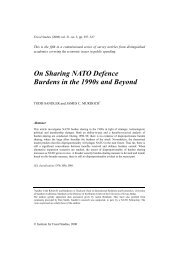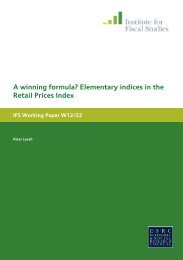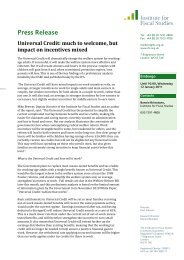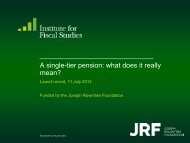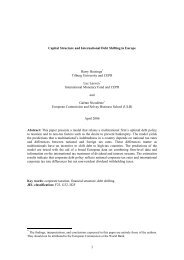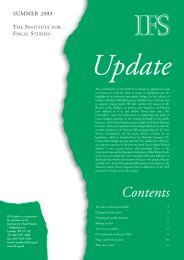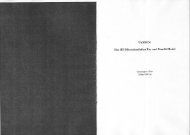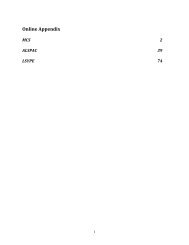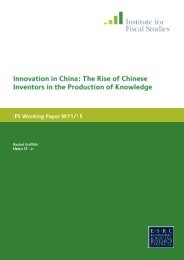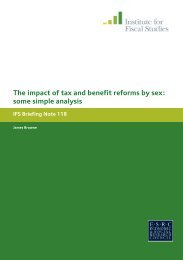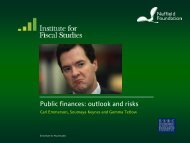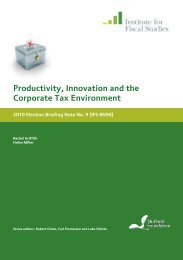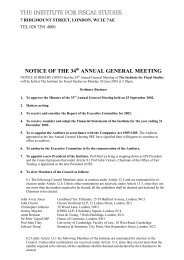A single-tier pension: what does it really mean? - The Institute For ...
A single-tier pension: what does it really mean? - The Institute For ...
A single-tier pension: what does it really mean? - The Institute For ...
You also want an ePaper? Increase the reach of your titles
YUMPU automatically turns print PDFs into web optimized ePapers that Google loves.
Conclusions<br />
overall reduction in their household income. Our analysis suggests that the<br />
redistributive effect of the changes to state <strong>pension</strong> income will be some<strong>what</strong><br />
offset by changes in <strong>mean</strong>s-tested <strong>pension</strong> cred<strong>it</strong> ent<strong>it</strong>lement. <strong>For</strong> example, while<br />
64% of sample members in the lowest wealth quintile live in households that<br />
would experience a net increase in state <strong>pension</strong> income, this figure falls to 40%<br />
when we take into account the loss of <strong>mean</strong>s-tested <strong>pension</strong> cred<strong>it</strong>. Conversely,<br />
we find that 62% of those in the richest wealth quintile live in households that<br />
gain in terms of their state <strong>pension</strong> income and this figure is unchanged when we<br />
take into account <strong>mean</strong>s-tested <strong>pension</strong> cred<strong>it</strong>.<br />
In the long run, the effect of the proposed reforms will be to reduce state <strong>pension</strong><br />
income for most people. <strong>The</strong> reductions will be largest for higher earners.<br />
However, the system will become less expensive to the exchequer, easier to<br />
understand and more transparent.<br />
W<strong>it</strong>h lower <strong>pension</strong> income coming from the state, later cohorts will need to save<br />
more privately for their retirement. Our calculations suggest that someone born<br />
in 1986 who earns at the lower earnings lim<strong>it</strong> (LEL) for 35 years would see their<br />
potential state <strong>pension</strong> income at SPA reduced from £8,618 per year to £7,629<br />
per year by the proposed <strong>single</strong>-<strong>tier</strong> reforms. To make up this defic<strong>it</strong>, they would<br />
need to save more privately for retirement.<br />
Exactly how current younger people will respond to this policy remains to be<br />
seen. <strong>The</strong> lower state <strong>pension</strong> income increases the need to save privately, and<br />
the reduced complex<strong>it</strong>y may also make <strong>it</strong> easier for people to engage w<strong>it</strong>h<br />
decisions about their retirement saving and may help them to make more<br />
appropriate decisions. <strong>The</strong> government will, however, need to communicate<br />
clearly and honestly w<strong>it</strong>h currently younger individuals to ensure they<br />
understand how this policy reform affects them and that they will need to save<br />
privately if they want to achieve more than the level of retirement income<br />
provided by the new <strong>single</strong>-<strong>tier</strong> <strong>pension</strong>.<br />
<strong>The</strong> lower exchequer cost in the long run suggests that this reform may be<br />
longer-lasting than the many others that have come before. <strong>The</strong> Office for Budget<br />
Responsibil<strong>it</strong>y’s long-run fiscal projections last year suggested that further<br />
reforms would be needed at some point to reduce upward pressure on public<br />
spending (or increase add<strong>it</strong>ional tax revenues) in future. To the extent that the<br />
<strong>single</strong>-<strong>tier</strong> reforms help to deliver this, they perhaps avoid some other policy that<br />
might also have been costly to these same cohorts.<br />
<strong>The</strong> <strong>single</strong>-<strong>tier</strong> <strong>pension</strong> system will be easier to understand and more<br />
transparent than the existing system. <strong>The</strong>re will be far fewer parameters for<br />
future governments to tweak if they are searching for short-term savings or<br />
giveaways. However, this is a risk as well as a virtue. Apparently small changes to<br />
the indexation of the <strong>single</strong>-<strong>tier</strong> amount could compound over time to imply a<br />
large change in state <strong>pension</strong> income for later cohorts – just as the decision to<br />
move the basic state <strong>pension</strong> from earnings to price indexation in 1981 did.<br />
Future governments and voters will need to be cognisant of this fact.<br />
69



